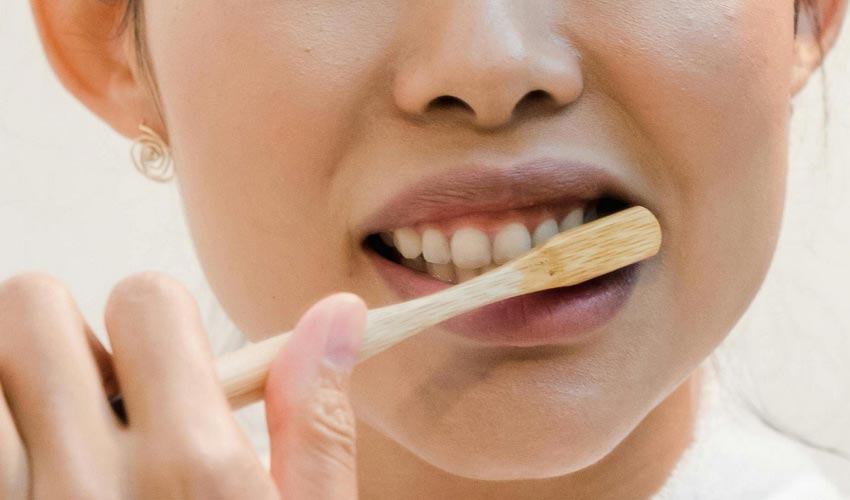What Your Tongue Reveals About Your Health
Don't underestimate the power of your tongue! This muscle hanging out in your mouth and throat is not just some taste-testing, speech-spouting, and food-swallowing tool. It's a multitasking hero, serving as both a defender of your precious health and a messenger of doom. "This little fella is a big deal," says Alexander Kerr, DDS, MSD, head honcho of oral medicine at New York University College of Dentistry. "You can learn a whole lot about someone from their tongue." Let's break it down, shall we? You've got the tongue that shamelessly flaunts itself in your mouth, known as the oral tongue (fun fact: it's only one-third of the whole package). Then there's the body or anterior tongue, which extends all the way from the back of your yapper down to your throat. Oh, and don't forget about the lingual tonsil, that little troublemaker perched on the body of the tongue. Turns out, this chunk of tongue is not just for show. It's like the body's bouncer, ready to tackle any viral intruders by unleashing the almighty immune response.
But that’s not all! The colour and texture of your tongue can reveal some seriously juicy details about your overall well-being. Infections, vitamin deficiencies, and diseases can all leave their marks on this muscular wonder. So, if you spot some funky stuff going on with your tongue, it might be time to call in the cavalry, aka an oral health specialist. Don't mess around when it comes to tongue drama. Your mouth deserves the best care, and your tongue deserves a standing ovation for all its hard work. So next time you're enjoying a delicious meal or belting out your favourite tunes, give a little nod of appreciation to your trusty tongue. It's got your back, or should I say, your front!

Black Tongue
Alright, we're diving into the mysteriously intriguing world of tongue colours! So, picture this: your tongue decides to rock the hottest fashion trend of the season and goes all dark and even hairy. Sounds gross, right? But don’t get scared, because this condition called black hairy tongue is as harmless as a fluffy bunny. Now, here's the science behind it. Your tongue has these tiny hair-like structures called filiform papillae. They're the taste-bud interpreters that make sure you experience the full spectrum of salty, sweet, sour, bitter, and savoury sensations. Pretty essential for the foodie life, right? In a normal scenario, a well-rounded diet with some rough and crunchy foods keeps these papillae in check. But sometimes, they decide to throw a party and grow longer than necessary, attracting bacteria like neighbourhood gossip. And guess what? Those bacteria can be quite the artists, turning your tongue into a dark and mysterious canvas.
Coffee and fruit juice like to join the party too, adding their vibrant colours to the bacterial masterpiece. Oh, and let's not forget about antibiotics, those sneaky little meds that can throw off the natural balance and make abnormal bacteria go wild on your tongue. If that's not enough, smokers get their own special edition of tongue discoloured madness. Tar and tobacco team up to give your papillae a nice dark or yellowish stain. Classy, right? But hey, not every tongue is a canvas for a funky bacterial masterpiece. Sometimes, a black tongue could signal a fungal or viral infection. You'd want to bring in the heavy artillery for that and consult an oral health specialist, dentist, or healthcare provider for a diagnosis. Now, here's the plot twist: for the bold and rare cases, a black and hairy tongue might be a symptom of hairy leukoplakia. Fancy name, right? This bad boy is associated with the Epstein-Barr virus, also known as human herpes virus 4. It usually hangs out with folks who have HIV, just to keep the party going.
So, what's the solution, you ask? Well, you can brush or scrape the top of your tongue if those hairs are giving you trouble. I recommend using High Quality Tooth Powder. The real secret lies in a healthy diet and giving up smoking. Those two things should keep things under control and prevent this whole hairy tongue spectacle. So there you have it! The thrilling tale of why your tongue might go all dark and hairy. It's like a soap opera happening inside your mouth, isn't it? Stay tuned for more tongue adventures, but preferably on a lighter and non-hairy note.

White Tongue
When your tongue is covered in a snow-white coat, it's a glaring sign that your poor old digestive system is working overtime. Talk about a workaholic! And let me tell you, this excess workload is not a good thing. It creates a perfect breeding ground for vicious bacteria called candida, which decides to set up camp on your tongue. Not exactly the kind of neighbourhood you want for your taste buds! I have some advice to revive your digestive system and get that tongue shining like a superstar. First up, get your hands on some fermented and probiotic foods. They may sound fancy, but they are miracle workers for your gut. These bad boys deliver live enzymes and healthy probiotics straight to your belly, kick-starting your digestive system into high gear. Say goodbye to candida and hello to a happy tummy. Now, let's talk about your lifestyle choices. Your digestive system is like a high-maintenance diva, and it depends on you to make the right decisions. Choosing nutrient-rich and properly portioned meals will keep your digestion flowing like a well-oiled machine. So, put down that bag of chips and grab some greens.
And don't forget about your oral hygiene! You brush and floss to keep those pearly whites shining, but did you know that your tongue needs some TLC too? Yep, giving it a good brush removes all those nasty bacteria that could wreak havoc on your digestion. Plus, if you've got a coated tongue situation going on, this is your chance to say goodbye to that bacterial buildup. Want to spice up your life? Well, your diet at least. Certain herbs and spices like ginger, turmeric, cardamom, fennel, and black pepper are digestive superheroes. They'll give your taste buds a kick while also improving your digestion. It's a win-win situation. Lastly, let's talk about enzymes. No, not the kind you find in a science lab, but the ones that supercharge your body's ability to handle food. Seek out foods, beverages, and supplements that are enzyme-packed because they'll make your digestive system do a happy dance. Plus, your body will absorb minerals like a boss. Remember, a happy belly equals a happy life!
Yellow Tongue
Did you know that a yellow tongue can be caused by more than just a heavy smoking habit or a questionable meal choice? Yep, turns out it could also be a fancy way for your body to say, "Hey buddy, something isn’t right inside!" According to those medical wizards at the Cleveland Clinic, a yellow tongue might just be a sneaky symptom of gastritis. Now, I know what you're thinking, "What the heck is that?" Well, it's a condition where your stomach lining decides to throw a pity party and gets all inflamed. And as the host of this stomach soiree, you get VIP access to acid reflux, aren't you lucky? Just like a black hairy tongue (sounds terrifying, I know), a yellow tongue can also be caused by a tongue carnival. Yep, it's a good old tongue party with filiform papillae, bacteria, and skin cells all invited. These party animals like to build up on your tongue, giving it that distinctive hairy appearance. Oh, and they love trapping things like tobacco smoke and colourful foods and drinks. Talk about a clingy bunch!
Now, if you're lucky enough not to have any underlying tongue issues, then good news! All you have to do is practice good old oral hygiene. Brush those pearly whites, floss like a boss, and if you feel the need, give your tongue a nice little scrape. Trust me, it'll thank you. So remember, if your tongue decides to take on a yellow hue, it might just be trying to tell you something. But with some good oral hygiene, you'll keep that tongue in tip-top shape and have a mouth that's as fresh as a daisy!

Smooth Tongue
Ever wondered why your tongue is such a chatty little thing? Well, according to the wise words of Kerr, that wiggly muscle can actually spill the beans on your nutritional deficiencies. Yep, your tongue is secretly a nutrition detective, and the most common culprit it uncovers is none other than iron deficiency. You see, if you're low on iron, those sneaky red blood cells can't deliver the life-giving blood to all the nooks and crannies of your body. And it turns out that our mouth tissues are the ultimate rejuvenators, constantly renewing themselves. But here's the twist: if you're iron deficient, some of those tissues miss out on the replacement party. It's like a sad version of musical chairs, where the filiform papillae (fancy name for those tiny bumps on your tongue) get worn down, but no fresh-faced cells step up to take their place. So what does this result in, you might ask? Well, picture a balding tongue. Yep, that's right. Your tongue can look as shiny as a cue ball, which might be a hint that you're dealing with anaemia or an iron deficiency. And let's not forget that chronic dry mouth can also give your tongue a Mr. Clean makeover. The Journal of the Formosan Medical Association spills the tea, stating that around 20% of people with a tongue that rivals a bald eagle's head have anaemia. And over 5% of them suffer from a vitamin B12 deficiency. So it's safe to say that your tongue isn't holding back when it comes to revealing the secrets of your nutrient levels. But don’t worry! A cunning clinician can come to the rescue by conducting tests to check for vitamin deficiencies. And guess what? These nutritional imbalances can usually be fixed with a trusty combination of supplements and diet changes. So don't let your tongue keep all the juicy details to itself. It's time to give it a well-deserved helping hand.
White Patches
Got a tongue that's playing a game of hide and seek? Those charming white patches could mean a few things. The star of the show is usually a benign troublemaker called geographic tongue, or migratory glossitis if you want to get hip. The Mayo Clinic explains that this cheeky condition causes certain parts of your tongue to vanish, leaving behind a splotchy masterpiece of white and red. It's like an abstract painting, but on your tongue instead of a canvas. Don't worry though, it's mostly harmless and won't give you any major grief, aside from the occasional soreness if it's feeling extra mischievous. And hey, it's so popular that it's practically mainstream. Another player in this tongue game is oral lichen planus. This bad boy can give you a racy lacy look, with the bonus of white patches, sores, or a tongue that's puffier than usual. The Mayo Clinic explains that it's all thanks to some inflamed mucous membranes in your mouth. And if that's not enough, we have oral candida making an appearance. This little troublemaker, also known as oral thrush, loves coating your tongue and throat with a thick white layer. It's like a party for yeast in your mouth, and it's a common side effect of cancer treatments. Denture wearers, diabetics, and folks popping certain medications like antibiotics or steroids have the added bonus of being more prone to this joyous infection. Oh, and our buddies with HIV? They get to join the fun party too. So what's the secret to getting your tongue back to its normal self? Improving your oral health is a good start, but if you're grappling with oral thrush, it's time to bring out the big guns. You'll be treated with some oral or topical antifungals, and within 1 to 2 weeks, your mouth will be singing hallelujah.
White or Red Spots or Lesions
According to the tongue expert extraordinaire, Kerr, noncancerous tongue issues are more common than bumping into your ex at the grocery store. However, don't let that lull you into a false sense of security, because tongue cancer is on the rise and it means business. The American Cancer Society has sounded the alarm, reporting that the death rate for mouth and throat cancers has been sneaking up year after year since 2009, marking an end to decades of decline. Oropharyngeal cancer, a fancy term for head and neck cancer that likes to hang out in the back part of the tongue, is the main culprit behind this alarming trend. Now, here's where it gets interesting - there's a battle of turf going on in the world of tongue cancers. Tongue cancers prefer to set up shop on the side or underside of the oral tongue, while oropharyngeal cancer is slacking off, chilling out at the throat-and-mouth party. Basically, different cancers, different zip codes. The back-of-the-tongue cancers, affectionately known as the HPV crew, mostly owe their existence to the human papillomavirus. So, how do you identify the bad boys? Kerr says keep an eye out for tell-tale signs like white patches, red patches, or a delightful red and white combo. If a sore or growth decides to make your tongue its new home, it's time to pay attention. Unlike your ex's Facebook posts, cancer spots don't just fade away. They'll keep growing for months or even years, hogging the spotlight. And if you spot a solo act, where it's just one weird spot hanging out on your tongue, chances are it's being a cancerous troublemaker. But hold on, not every little blip is cause for alarm. The tongue is a pretty sensitive creature and tends to get into skirmishes with sharp teeth, bites, or even burning encounters. Usually, these scuffles heal themselves over time. However, if your tongue sore has decided to be stubborn and overstays its welcome for more than two weeks, it's about time you schedule a pow-wow with your healthcare provider. Plenty of tumours are benign and won't cause you more trouble than your neighbour's bulldog, but catching any cancer early is a big deal for a happy ending. Kerr is not one to mince words when it comes to tongue cancer. He throws in some scary knowledge that as tongue cancers make their way through life, they can crash the party in your neck region, spreading to the lymph nodes. Not the kind of surprise you want at any gathering, trust me. Now, let me give a shout-out to the herpes simplex virus, the less malicious but still annoying party crasher. According to some smarty-pants researchers in Malaysia, tongue sores caused by oral herpes are a mixed bag of white and red ulcers. These little troublemakers can be a real pain, but fear not, there are meds like acyclovir, valacyclovir, and famciclovir that can help keep these uninvited guests in check. So, the bottom line is, don't let your tongue become a battleground for cancer or viruses. Keep an eye out for suspicious spots, give any lingering sores the boot after two weeks, and remember, catching any intruders early is key for a happy ending!

To keep your tongue healthy, here are some tips you can follow:
- Practice Good Oral Hygiene: Brush your teeth at least twice a day and also gently brush your tongue. This helps remove bacteria and food particles that can contribute to bad breath and other oral health issues.
- Scrape your Tongue: Use a tongue scraper or simply the back of your toothbrush to gently scrape the surface of your tongue. This helps remove the buildup of bacteria, debris, and dead cells.
- Stay Hydrated: Dry mouth can contribute to bacterial growth on the tongue. Drink plenty of water throughout the day to keep your mouth and tongue moist.
- Maintain a Healthy Diet: Include a variety of fruits, vegetables, whole grains, and lean proteins in your diet. Avoid excessive consumption of sugary and acidic foods as they can promote the growth of harmful bacteria.
- Avoid Smoking & Excessive Alcohol Consumption: Smoking and alcohol can irritate the tongue and increase the risk of oral health problems.
- Regular Dental Check-Ups: Visit your dentist at least twice a year for professional cleanings and oral exams. This allows any potential tongue or oral health issues to be detected early.






















